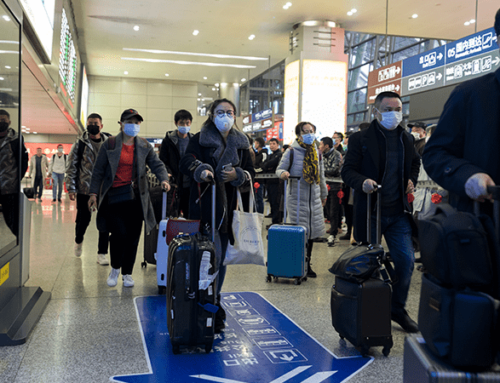
What Brexit means for your travel abroad
At 11pm on 31 December, the Transition Period will have concluded and new rules for travel to the EU will apply. Brexit will be complete. Notwithstanding the current travel bans imposed on the UK by many member states due to the new Covid mutation, the ease with which British passport-holders have been able to travel to the bloc is about to be replaced with new procedures.
Covid restrictions
The new Covid variation identified in South-East England this month has seen travel bans put into place on the UK by many parts of the world. However, prior to this, EU member states agreed on a common framework for allowing non-essential travel within the bloc.
A traffic light grading of Covid infection rates determines the level of restriction, ranging from free movement (green) to the requirement of a negative PCR test for entry (red). It applies to EU members and a small number of “third countries” with low infection rates. The UK will not qualify from 1 January, meaning that non-essential travel is restricted. However, this is superseded by individual temporary bans and the Foreign Office “recommending against all but essential travel”. Individual EU members can also apply their own rules and could allow travel from the UK – or parts of it – dependent on various conditions, such as a negative Covid test, being met. The next review of third countries permitted to travel to the EU is likely to be 11 January.
Passports and border procedures
The burgundy-coloured European Union-branded UK passports will continue to be valid until they expire. Until tomorrow, a passport needs only to be valid up until the day of return to the UK. From Friday, there must be at least six months’ validity on the day of travel, and a passport must be less than 10 years old.
This second point is particularly important for anybody who has renewed their passport and had the unspent time – up to nine months – added to their new passport. This “extra” time will no longer be considered valid, ruling the required six-month buffer obsolete. The government has an online checker to clarify whether your passport is valid for your chosen destination and travel dates: gov.uk/check-a-passport-travel-europe-1-january-2021
And to confuse matters further, the EU’s position on passport validity for third countries such as the UK is that they must be “valid for at least three months after the date you intend to leave the EU country you are visiting”. To avoid the possibility of being refused boarding on an outbound journey, it would be wise to follow the UK’s six-month requirement.
On arrival in the EU, biometric passport holders will not be able to use e-gates and standard passport holders will also have to forgo fast-track EU lanes at airport and Eurostar passport control. Additional document checks could add considerable time at border control.
However, European countries which consider the UK an important tourist market could offer a swifter passage – Portugal has previously indicated that Faro and Funchal airports would provide fast-track access to British passport-holders.
Length of stay in the EU
The length of time that British travellers can stay in the Schengen area countries is about to be reduced: 90 days in one 180-day period, or roughly three months, twice a year. The three-month blocks cannot be rolled into one; visitors must return home and wait for the 180 days to expire after spending their initial 90 days in the bloc, before returning again. You can calculate how much time you have unspent at ec.europa.eu/home-affairs/content/visa-calculator_en
Visas
The Etias visa-waiver programme – similar to the US Esta – will be a requirement for British tourists when it is implemented. This is earmarked for 2022 but the date has not yet been confirmed. The cost will be €7 and will be valid for three years, or until the passport expires. There is not yet an official website, but many third-party sites in operation. Apply only via the official channel; check ec.europa.eu for updates.
Healthcare
The European Health Insurance Card (Ehic) has entitled British travellers to state-provided healthcare should they fall ill or have an accident while in the EU, Switzerland, Norway, Iceland and Liechtenstein. It also covers routine maternity care and treatment for pre-existing conditions such as kidney dialysis. This reciprocal agreement comes to an end tomorrow, but the Government says it has agreed a new reciprocal healthcare agreement.
In practice, this means that Ehic cards issued until the end of 2020 will continue to be valid until they expire. They will be replaced by a UK Global Health Insurance Card (Ghic), but details of which countries it will be valid in have not yet been released. New Ehic applications will be issued with a Ghic. However, both the Ehic and Ghic will not be valid in Norway, Iceland, Liechtenstein or Switzerland.
UK nationals that require specialist treatment, such as dialysis, must “seek authorisation to receive planned medical treatment” with a healthcare provider in advance of travel, but essentially, healthcare needs will be met.
However, what hasn’t changed is the importance of taking out travel insurance that will cover medical costs and repatriation, particularly for those with pre-existing medical conditions. It is likely that the cost of travel insurance will rise regardless of the new healthcare provision.
Driving
An International Driving Permit will not be required when driving in the EU, Switzerland, Liechtenstein, Norway and Iceland, unless you have a paper driving licence – check individual countries’ requirements via the appropriate embassy.
If driving your own car, you’ll need to take a valid driving licence, the V5C log book and your insurance certificate, as well as a Green Card (including for Ireland) – these can be obtained (in good time) from insurance providers, who will either post out a hard copy or email one to print at home.
You should also display a separate GB sticker, even if your car displays the Euro symbol and Great Britain national identifier on its number plate.
Pets
Pet passports will not be valid from 1 January 2021, unless you live in Northern Ireland. Instead, travellers will need to obtain an animal health certificate to prove their dog, cat or ferret has been vaccinated against rabies. These must be issued by a vet no more than 10 days prior to travel and can be used for up to four consecutive months from the date of entry to the EU.
Travellers to Ireland, Northern Ireland, Finland, Norway and Malta must also treat their dog against tapeworm no more than five days before travel.
Mobile roaming
Roaming charges were abolished by the EU in 2017, marking the end of potentially exorbitant costs for using your mobile phone abroad. However, the new trade deal only asks network providers to have “transparent and reasonable rates”, meaning that British nationals could once again be subject to additional charges on top of their contract. However, the major providers – EE, Vodafone, 02 and Three – have confirmed that they do not intend to reintroduce roaming charges.
The Common Travel Area
Freedom of movement within the Common Travel Area (UK, Ireland, Isle of Man and Channel Islands) continues from 1 January. Passports need only be valid for the duration of your stay, rather than the six-month minimum required for the rest of the EU. However, customs controls will be reintroduced between the UK and the island of Ireland.
Duty-free and prohibited goods
Duty-free liquor and tobacco sales will be available to EU-bound travellers from the UK from 1 January. It is likely that this will be extended to the Republic of Ireland. Up to 200 cigarettes an be brought into the UK duty-free, four litres of spirits, 16 litres of beer and 18 litres of wine (nine litres of sparkling wine).
However, it will no longer be possible to take “meat, milk or products containing them into EU countries from 1 January” (although baby formula and pet food are exempt) – so take care if you are considering taking food on a self-catering holiday, or your own food to eat on the plane, train or ferry.
Discover By Category
Holiday Types
...
Destinations
...


